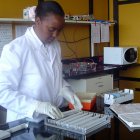General
Women comprise less than a third of the computer science, engineering and physics fields in some of the world's key emerging economies, according to a report.
They also represent a small minority in leadership positions, such as heads of universities or science academy members, said the report, which was published this month (2 October) by Women in Global Science & Technology (WIGSAT), a consulting group based in Canada.
The study examined data on female scientific enrolment and employment, and work-related policies such as child-care, equal pay and flexible work arrangements in Brazil, India, Indonesia, Korea and South Africa, as well as the United States and European Union.
It found that these countries - at the forefront of technical advancement - have failed to open up their knowledge societies to women, thus reducing the creative workforce that could help these countries grow and develop.
"Numbers of women in the science, technology and innovation fields are alarmingly low in the world's leading economies, and are actually on the decline in many, including the United States," said the report.
Women are under-represented among academic leaders, too: in 2010 in South Africa 13.8 per cent of public universities were headed by women and in Brazil, just 10.9 per cent.
In South Africa, 28 per cent of science academy members were women in 2010, while in most other countries women represented less than 12 per cent of science academy members.
Sophia Huyer, WIGSAT's executive director, told SciDev.Net that countries are not "taking full advantage of women in the knowledge sector".
She said the research showed that countries lack adequate policy and social support for women, such as the ability to make flexible working arrangements, and access to affordable childcare.
Many countries also lacked sex disaggregated data, suggesting that the governments had not analysed their policies on women and women's participation in the workforce.
Among the emerging economies studied, Brazil ranks highest for supportive policies and employment of women in science, engineering and technology; India ranks lowest but is has shown signs of improvement.
Sudha Nair, former head of India's JRD Tata Ecotechnology Centre, who worked on the WIGSAT study, attributed India's lowest rankings to the country's size and diversity, but highlighted its progress on policies - included in its 11th Five-Year Plan - to encourage the study and practice of science and technology.
"India will still have to work out innovative programmes to see how we can attract and retain [women] in science, engineering and technology."
Yupa Hanboonsong, a researcher at Khon Kaen University in Thailand, said the report reflects her observations in Thailand. She said that a large number of girls study science and engineering, but when it comes to a career path "we tend to have less women".

Numbers of women in science are alarmingly low in emerging economies, the report found
Flickr/CIMMYT
